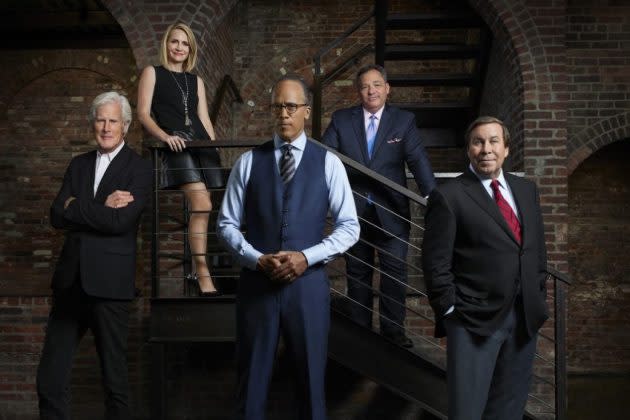NBC’s ‘Dateline,’ Once a True-Crime Documentary, Has Become A Massive Content Stack
- Oops!Something went wrong.Please try again later.
- Oops!Something went wrong.Please try again later.
- Oops!Something went wrong.Please try again later.
- Oops!Something went wrong.Please try again later.
- Oops!Something went wrong.Please try again later.
- Oops!Something went wrong.Please try again later.

The people who make NBC’s “Dateline” are trying to solve another mystery — but this one will likely never be seen on TV.
The show has become known for presenting true-crime stories on NBC’s Friday nights, when Lester Holt and correspondents including Andrea Canning, Josh Mankiewicz, Keith Morrison and Dennis Murphy take viewers across difficult emotional terrain. A crime has been committed and the victim’s loved ones want justice. Now, in the streaming era, Friday nights are no longer enough.
More from Variety
“You can’t just put your show on broadcast and hope the show’s going to do a big number,” says David Corvo, senior executive producer of “Dateline,” in an interview. “You have to accumulate that number over a number of different platforms.”
Soon, one of those will be Peacock, where the show’s producers expect to launch a new “Dateline” format, one that isn’t tied to the rhythms of broadcast TV and will have an almost documentary style to it. The new series will aim to recreate the crucial last day of a victim’s life, examining decisions that were made, and the turn of fate that ended up making the difference between life and death.
“We don’t have to adhere to limits on minutes,” explains Liz Cole, executive producer of “Dateline” and president of NBC News’ documentary studio unit, in an interview. “We can have a little bit more freedom with pacing. We can be a little more leisurely at times.”
The effort to expand “Dateline” is taking the program into new frontiers, including podcasts, 24/7 streaming channels and even scripted fare, as seen in the recent NBC limited series, “The Thing About Pam,” which starred Renee Zellweger. And it comes as many of the backers of the old-school “newsmagazine” format are experimenting. ABC News, for example, has placed more emphasis on two-hour-long episodes of “20/20” in recent years, the better to those programs on Hulu and entice subscribers who might have a yen for movie-length true-crime documentaries. The shows are also vying with a growing slate of streaming selections centered on true crime that are in rotation in the libraries of streamers like HBO Max, Fox Nation and Netflix.
In an era when viewers can often binge their way through old episodes of their favorite programs, “Dateline” can make use of its past work. Since launching in 1992, “Dateline” has amassed more than 2,870 episodes. In a different era, they would all be consigned to some NBC archive where the occasional producer or researcher might seek out a snippet of old footage. In the streaming era, however, a significant number of them can be put back into use through playback on some of the cable networks owned by NBCUniversal; syndication; or a bespoke Peacock streaming channel, where episodes are sometimes curated by topic. Nearly 120 hours of Dateline have aired during any given week this quarter across broadcast, cable and syndication.
Not every broadcast is of use in the current environment. In a different era, “Dateline” was once a multi-story newsmagazine anchored by Stone Phillips and Jane Pauley, among others. Some episodes may have been relevant in the past, but are not so now. But producers are assigned to keep many of the true-crime stories current, says Corvo, adding new elements if a turn in the case depicted should take place, or tweaking such things as music if it is no longer germane.
Video isn’t the only path “Dateline” producers are pursuing. Since 2019, the show has created seven different podcasts – some original and some in the form of what is known as a “showcast,” or the audio track of an original episode.
No matter the format, however, “Dateline” has some required building blocks. “There is a bit of a soap-opera quality to it, in the best sense of that word,” says Corvo. “The stories that do well have a strong community of family and friends of the victim, so we know what the consequences of the crime are. We feel it and we care about it. For someone to be involved in it more than a procedural, it has to mean something to somebody.”
Meanwhile, the show’s producers will keep on trying to find new ways to get “Dateline” mysteries in front of those who want more cases to crack. “I don’t think the average viewer realizes how much broadcasting has changed,” says Corvo. “We are an example of somehow trying to stay in front of it.”
Best of Variety
Sign up for Variety’s Newsletter. For the latest news, follow us on Facebook, Twitter, and Instagram.
